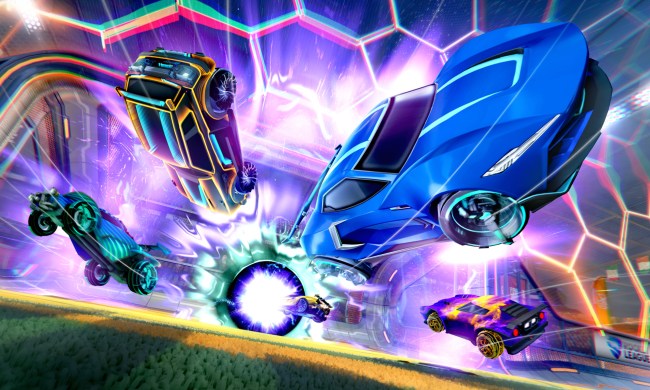Exploring dystopian worlds resplendent with cybernetic enhancements and megacorporations, cyberpunk continues to evolve the more its science fiction-based future becomes reality. The following interactive interpretations of the subgenre draw upon a wealth of insight, whether it be in human relation, technological prowess, or even video game development. It is not so much the story or even the characters, so much as it is the world that marks the best cyberpunk games of all time.
In the wait for the postponed release of Cyberpunk 2077, these games are the best way to quell that ever-growing appetite for cyberpunk. Otherwise, escape through other options, from the best VR games to the most satisfying 2020 indie experiences.
Snatcher

Before the now-iconic Silent Hills playable teaser and Death Stranding, Hideo Kojima followed up Metal Gear with a cyberpunk classic, called Snatcher. Upon its 1988 release, despite limited sales, the graphic adventure garnered an immediate cult following. The narrative follows an amnesiac who joins an agency hunting “Snatchers,” or robots killing and taking the place of humans. With its semi-open world, coupled with thought-provoking themes and novel visual elements, Snatcher remains a benchmark in science fiction gaming and a must-play Kojima title.
Blade Runner

Like Neuromancer by William Gibson, Philip K. Dick’s Do Androids Dream of Electric Sheep is a pivotal novel in the expansion of the cyberpunk subgenre. Its Hollywood rendition, Blade Runner, would go on to become even more renowned, evolving into the face of cyberpunk and influencing many years’ worth of media in its likeness. Though it may not be remembered as well as the novel or film, Virgin Interactive’s Blade Runner, released in 1997, captured a similar essence as its predecessors. Rather than replicate Ridley Scott’s work, Westwood Studios instead told a story that intersected with the original, following Ray McCoy on a quest to destroy the last remaining replicants. Blade Runner stands among the best cyberpunk games of all time for granting fans an interactive experience within its remarkable world, now the inspiration for various cyberpunk offshoots.
System Shock

Made all the more enigmatic from spiritual successors, like Deus Ex and BioShock, 1994’s System Shock opened the doors on interactive cyberpunk and horror. The gameplay of System Shock alone was an innovative step forward in the industry, dropping players into the 3D environment of a space station in the year 2072. Reminiscent of 2001: A Space Odyssey, the story of System Shock is led by an unspecified hacker in an attempt to thwart an evil computer system, known as SHODAN. A remake of the famed original is currently being developed by Nightdive Studios for release sometime this year.
Syndicate

For an isometric strategy game, Syndicate proved itself to be an outlier with a cyberpunk story and gameplay elements that set it apart from all the rest. It was released in 1993 by EA and garnered immediate success. The player assumes control of a corporation with the goal of global dominance through the aid of taxation and cybernetically enhanced operatives. Once a country is taken over by these pawns, the player can accrue money through taxation, but only if they are vigilant. If a country is pressured for too much, the citizenry may start a coup. Surviving assassination attempts via government agents or rival syndicates is also a key component of the game. Syndicate not only sparked various expansions, but also a sequel and reboot.
Final Fantasy VII

Without a doubt one of the greatest video games of all time, packing an emotional punch at every turn in its expansive narrative and exploration of a world riddled with tyranny, Final Fantasy VII is exemplary of Japanese cyberpunk. The 1997 original PlayStation experience emulates Akira in many ways, showcasing the evil megacorporation of Shinra hoarding the planet’s last remaining sustainable resource. Cloud, the main protagonist of Final Fantasy VII, is unwittingly flung into class warfare, going up against not only Shinra but the potentially world-shattering Sephiroth. The recently released Final Fantasy VII Remake is a testament to the greatness of its predecessor, giving only a tiny glimpse into the epic cyberpunk adventures of Avalanche and their fight to save the planet.
Deus Ex

Deus Ex was a critical success upon its 2000 release, spawning several re-releases, PC mods, sequels, and prequels that would inevitably cement it as a video game series with unreplicable stature in the industry. The initial title tracks JC Denton, a United Nations Anti-Terrorist Coalition agent with nanotech augmentation, which ranges from 18 different in-game options. A central mechanic in Deus Ex is player choice, allowing players a multitude of varied avenues for mission completion. What makes the cyberpunk title stand out most is its heavy-hitting narrative based in an alternate history, wherein real-world conspiracy theories are fact. With six titles in the series, the last of which was seen via 2016’s Mankind Divided, Deus Ex is due for a welcome return.
Cloudpunk

Simon Parkin of The Guardian says it best: “… it’s a cliché that invites clichés: ‘sprawling,’ “neon-lit,’ ‘Blade Runner-esque.’ Still, over-familiarity with the aesthetic does little to blunt the fierce appeal of Cloudpunk’s game world.” Released mere weeks ago, Cloudpunk offers players a chance to visit a true cyberpunk world as an immigrant named Rania. The player is tasked to pick up and drop off packages at the behest of the Cloudpunk delivery service. The various adventures across the city, which is outlined by crisscrossing vehicles and high-rises, is what makes a seemingly laborious playthrough the hallmark of Cloudpunk. Not only is the game’s world mesmerizing, but its cyberpunk-laden story is compelling. The more Rania traverses the innards of the futuristic city, the darker Cloudpunk becomes.
Transistor

Based in the city of Cloudbank, a well-known singer by the name of Red acquires a powerful sword, called the Transistor, following a botched assassination on her life. Through the help of robotic commandos, known as the Process, the malignant Camerata stops at nothing to hunt down Red and retrieve the lost artifact. Transistor, despite being an isometric RPG, still enjoys greatness through a wondrous narrative uplifted by an even more evocative soundtrack. The game was nominated for many accolades, inevitably walking away with IGN’s Best Art Graphics and the D.I.C.E. Sprite Award in 2015. Due to its subversion of the more commonplace cyberpunk themes, Transistor remains among the best in the subgenre.
Mirror’s Edge

Inciting new ways of thinking about world traversal and surface lighting in video game development, Mirror’s Edge gave cyberpunk new vibrancy. The action-adventure platformer, which was developed by EA DICE and published by EA in 2008, takes place in a dystopian near-future city, wherein a totalitarian and militaristic government reigns supreme. The player controls Faith Connors, one of many “runners,” navigating her across rooftops and ventilation shafts with their own varying degrees of impediments. Rather than explore a dark noir and neon-tinged world like others among the best cyberpunk games, Mirror’s Edge instead focuses on minimalist and luminous environments that serve as the player’s only savior.
Observer

Bloober Team, known for horrors like Layers of Fear and Blair Witch, delivered a simultaneously terrifying and intriguing experience with 2017’s Observer. In the year 2084, following a digital pandemic that wiped out large swaths of the globe, a megacorporation rules over Poland using detectives, known as Observers. After a cryptic phone call from his long-lost son, Daniel Lazarski uses his investigative prowess to find and hopefully save his only child, yet inevitably finds himself spiraling into damnation. The cyberpunk horror is getting a next-gen facelift with additional content available later this year upon the debut of the PlayStation 5 and Xbox Series X.



